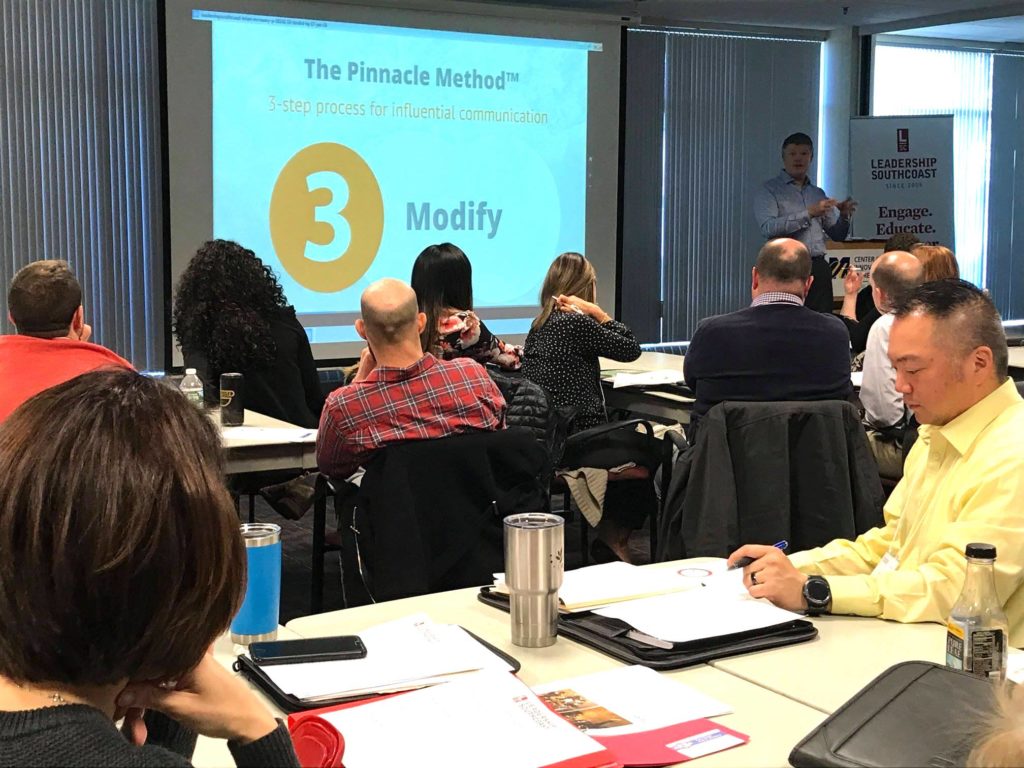Learn to Communicate with Brian McNeany

Brian is Groundwork’s resident communication expert.
Brian McNeany was a classmate of mine in the 2017 Leadership SouthCoast cohort. During an ice-breaker we discovered we had both spent time on the West Coast, and ended up trading war stories about the 401, the 101, and the unique LA freeway experience. Brian later became a member of Groundwork!, and I discovered that we both share a love of IPA’s.
Although Brian isn’t shy and can certainly hold his own speaking in front of a crowd, he also knows how to listen, which earns him my utmost respect. His company teaches business professionals how to communicate, and we’ve been talking about showcasing his work at Groundwork! for a long time.
In this interview, Brian shares a bit about the work he does with Pinnacle Performance Company, and some of his top communication tips.
If you want to step up your communication skills, Brian will run a lunch and learn workshop right here at Groundwork! on May 2. Check it out here, and enjoy the interview:
Describe what you do at work.
At Pinnacle Performance Company, we teach business professionals around the globe how to engage their audience, project confidence, and be more persuasive and influential communicators. We do this by teaching Intention-based communication techniques. These time-tested techniques are based on the same skills professional actors have learned in acting schools and conservatories for centuries. We apply them to business communication to ensure business people deliver their message with a clear understanding of what they want their audience to do as a result of their communication. This helps their audience understands why their message is important to them.
I’m the Executive Vice President of Client Relationships for the Americas, which means my team and I are responsible for growing and maintaining the relationships we’ve established with our clients: Fortune 1000 companies, non-profits, boutiques, and organizations in between. I manage a fantastic team of Global Account Directors, Client Relationship Managers and Account Coordinators. Actually, they do an excellent job of managing me. :D

Brian taught a communication workshop to the Leadership South Coast class of 2018.
What are the most common things your clients are looking to improve when they work with you?
We cover a wide range of communication skills areas: stand-up presentations, meeting facilitation, 1-on-1 conversations, virtual communication, etc. We can apply our training to almost any forum or format where our client’s employees need to be more confident, compelling and clear with their message. We work with the C-level, sales teams, customer service, new hires– any level really, because, while the foundation of our training is the same, we customize our communication skills training to any level of experience because each level has a different need.
What are some common communication issues that you encounter with your clients?
To name a few:
- Presenting to senior leadership, stakeholders and/or company ownership. This can be a very intimidating environment, and it’s crucial to not let those nervous jitters take over, as well as to be concise with an impactful message!
- Helping subject matter experts (SMEs), whether they’re in tech, finance, or HR, keep their message on target and teaching them strategies on how to best handle difficult questions or objections they may receive from clients or customers.
- Perhaps the biggest need we’ve seen in recent years is developing the communication skills of newly promoted managers who have little to no experience delivering performance reviews, handling difficult conversations, or engaging, motivating, and involving their teams to achieve the organization’s broader business goals.
How do you address those issues?
We deliver our communication skills training in a variety of ways: in-person workshops, blended learning (video learning and in-person workshops), virtual coaching, etc. To address specific communication challenges, a great place to start is to use our 3-step process for influential communication called the Pinnacle Method. Business professionals can use it in any setting: conference calls, meetings, presentations, performance reviews, etc.
Here’s the 3-Step Process for influential communication:
- First, analyze your audience. Who are they? What benefit can you provide to them? What questions might they ask? How do they feel about you? What do they know or not know? You have to start by analyzing your audience, because every audience is different and is going to present different challenges.
- Second, understand how you want them to feel and what you want them to do as a result of hearing your message. This is critical because understanding what you want your audience to do as a result of your message gives you a clear objective.
- Third, modify your delivery using intention – strong one word verbs (motivate, persuade, engage, etc.) that will inform your word choices, vocal dynamics, gestures, movement, facial expressions, etc. Your intentions will change depending on how you want them to feel and what you want them to do. Using a strong intention will also help ensure your communication is aligned.
To use an analogy, your objective is a target and your intention is an arrow. By making sure they are congruent, you have a better chance of ensuring sure your message (the arrow) hits the bullseye (the objective) and more likely to get what you want after delivering your message.
What are your top tips for giving a good presentation?
Start with the Pinnacle Method: Analyze, Understand, Modify. After you know what you want your audience to do and what intentions you’re going to use to deliver your presentation, develop the content accordingly.
Here are a few more keys to great presentations:
- Embrace the theory of primacy and recency, which means your audience is going to remember the beginning and the end of your presentation. Start strong and finish strong so your audience has a clear understanding of what you want them to takeaway from your presentation.
- Practice, practice, practice! Most business professionals spend their time focused on creating content and not nearly enough time focused on how they are going to deliver it. Professional actors spent one hour rehearsing for every minute they spend on stage so they are confident and prepared to deliver the story to the audience. Business professionals should spend five minutes rehearsing for every minute of their presentation. The more comfortable you are with your material, the more confident you will appear to your audience.
- Be present in the moment, and don’t relive any mistakes you may make! It’s not whether or not you misspeak or not say something the way you wanted to; that happens to everyone – even the most experienced presenters. The key is to make sure that you don’t dwell on that error or moment and keep moving forward confidently and passionately with your message.
Join us for Brian’s workshop on May 2! Register here.
- Meet Our General Manager: Nicole Cosme - February 26, 2024
- Can I use a coworking space for Google My Business? - April 26, 2023
- Marketing Lab: The Best Business Resource on the South Coast You Didn’t Know About - March 23, 2023
